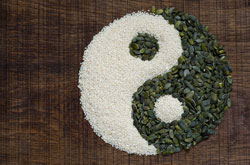Hypertension (high blood pressure) is when your blood pressure reads above 140/90. This means the pressure of the blood inside your arteries is high and your heart has to work harder to manage circulation around your body. Often there are no clear signs that you may have hypertension and the only clear way to know is to get it checked.
Hypertension is a precursor to many illnesses. Luckily, there are many simple lifestyle changes you can make to help lower your blood pressure such as eating a healthy diet, finding time to relax and regular acupuncture treatments can help.
A TCM Perspective
Your emotional health is a very important factor when talking about hypertension. Difficult emotions such as worry, anger, resentment and guilt may damage the Liver Qi creating heat that rises up to create hypertension. Too much stress, overwork and poor diet choices can deplete the qi and blood creating an imbalance between the organs that causes the development of internal heat and/or dampness which may manifest as hypertension.
Often there is no obvious cause for hypertension; it could be familial, it could be linked to another underlying health condition or it may have no apparent link to your health or family history whatsoever.
Acupuncture and herbal medicine can help manage your blood pressure. Your practitioner will assess your constitution and current health to make a TCM diagnosis and determine the best course of treatment for you. Many herbs have anti-hypertensive properties, such as Shan Zha, Luo Bu Ma Ye, Tian Ma and Xia Ku Cao to name just a few. Your practitioner will select the most appropriate herbs on a case-by-case basis to create a formula that will match your unique health patterns. Acupuncture can also help to lower symptoms of hypertension by helping to relax your nervous system and restore balance to your qi.
Here’s a few top tips to help reduce hypertension:
- Eat Regularly: Long gaps between meals on a regular basis can destabalise your metabolism and makes you more reactive to stress. Equally, constant grazing can damage your digestive function and create weakness in the organs which leads to deficiency, stagnation and dampness. Don’t miss breakfast; it sets your metabolism in motion for the day!
- Reduce Alcohol and Caffeine: These trigger the release of stress chemicals which affect your blood pressure and heart rate. Try drinking chrysanthemum tea instead – this is a herbal tea that cools, calms and descends qi.
- Stop Smoking! Smoking causes the blood vessels to narrow and can damage the walls of the arteries which will increase pressure.
- Cut down on Sugar and Salt: They can exhaust the adrenal glands, dehydrate your body which can decrease blood volume making in harder for your heart to pump and therefore increase your blood pressure.
- Eat foods with L-Trypyophan: A necessary amino acid to help improve your mood and have a beneficial effect on lowering blood pressure. High L-tryptophan foods include seeds & nuts, tofu, cottage cheese, yogurt, fish and turkey.
- Eat whole grains, cereals and pulses: Whole grains are rich in nutrients, less processed and also help to deliver the L-Tryptophan to your brain. They will make you feel fuller for longer as they are a more complex carbohydrate and rich in fibre so you are avoiding blood sugar spikes.
- Eat more green vegetables: They are rich in vitamins and minerals and help to support your liver qi plus the fibre will help your digestion. Celery (especially juiced) is particularly beneficial for cooling the liver and reducing hypertension.
- Stay away from animal fat: Too much meat and deep fried food lowers your body’s energy to deal with stress and can contribute to high cholesterol which causes obstruction in your arteries.
- Regular exercise: Exercise helps to move your qi, support metabolism and reduce your stress. Tai Chi and Qi Gong are traditional meditative exercises that help to restore balance to your qi and calm the nervous system. Any exercise you can do outside is even better – more calming time in nature and more fresh air.
- Reduce stress and get support from your family and friends: Try meditation, gentle exercise, taking a walk or going to bed earlier. Creating a support network of friends and family to help you improve your health and offer emotional support is really important; your qi benefits from spending quality time with others.


